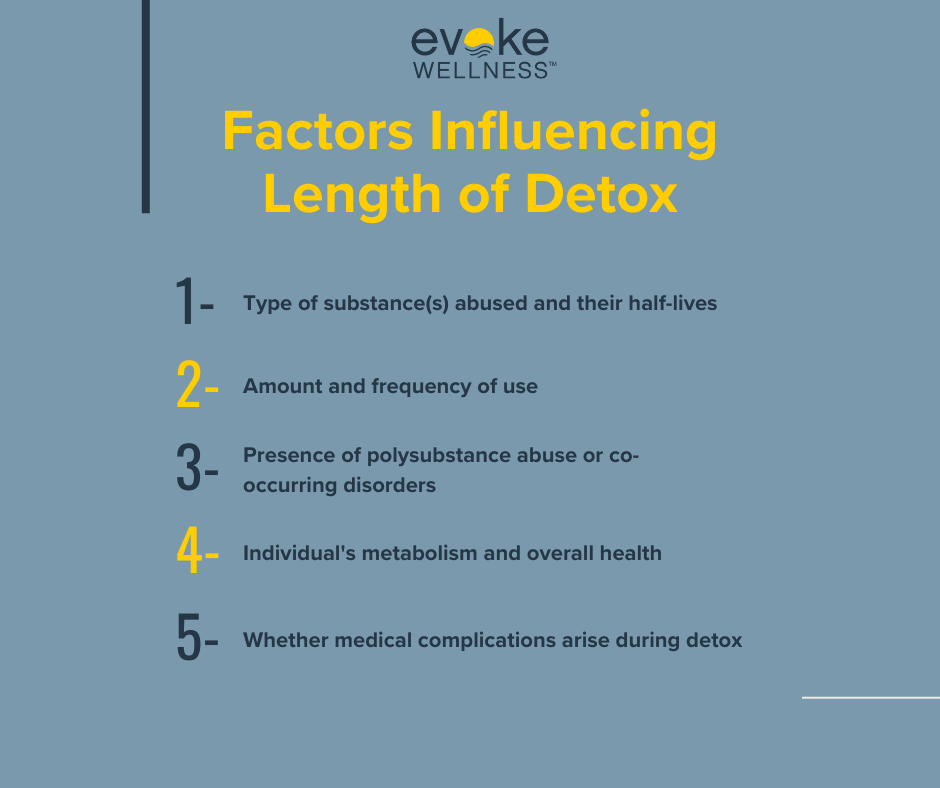Are you or a loved one considering detox from drugs or alcohol? Understanding the timeline and process of acute withdrawal is crucial for a successful recovery journey. As you contemplate taking this brave first step, you may wonder: “How long does a typical detox program last?” The answer varies depending on several factors, including the substance used, duration of addiction, and individual physiology. In this article, we’ll explore the general timeline of acute detox, common withdrawal symptoms, and what you can expect during a professional detoxification program. Armed with this knowledge, you’ll be better prepared to make informed decisions about your path to sobriety and long-term wellness.
Together, let’s embrace the journey to recovery and the promise of a new beginning. Call us at (833) 819-6066 today or reach out online.
How Long Do You Do a Detox For?
The Duration Varies
The length of a detox program can vary significantly depending on several factors. Some general guidelines on typical detox durations include:
- 3-7 days for alcohol or drugs with short half-lives
- 7-10 days for opioids like heroin or prescription painkillers
- 10-14 days for drugs with longer half-lives like benzodiazepines
However, these are just rough estimates. The specific timeline depends on the substance(s) used, the severity of the addiction, co-occurring mental health issues, and the individual’s physical and mental health.

Inpatient vs. Outpatient
Inpatient detox, with 24/7 monitoring, is recommended for severe addictions or complicated cases. Outpatient is an option for milder cases. Inpatient detox typically lasts 5-14 days.
Outpatient may last 5-10 days but often requires a longer, step-down period with continued support and counseling. The full “detox” process can take 30-90 days in an outpatient setting.
What Happens on Day 3 of Detox?
Physical Symptoms Intensify
On day 3 of detox, physical withdrawal symptoms tend to peak. According to medical experts, common side effects like anxiety, insomnia, sweating, fevers, and nausea are often at their worst around this time. Your body is working hard to eliminate the substance from your system.
Mental and Emotional Challenges
In addition to physical discomfort, day 3 can bring intense psychological symptoms. You may experience agitation, panic attacks, depression, and powerful cravings as your brain chemistry recalibrates. It’s a crucial time to stay committed to your recovery goals.
Medical Supervision Is Key
Attempting detox alone on day 3 can be dangerous due to the risk of seizures and other severe complications. A medically supervised detox program provides around-the-clock care and medications to manage withdrawal safely. Counseling and support also help you get through this challenging phase.
Stay Focused on Recovery
While day 3 is often described as the hardest part of acute detox, remember that this intense period is temporary. With proper medical care and a strong support system, you can get through this pivotal step and establish a firm foundation for long-term sobriety.
Detox Timeline
Acute Withdrawal Phase
The initial detox timeline focuses on managing acute withdrawal symptoms. This phase typically lasts 5-10 days, with symptoms peaking around 72 hours. Common symptoms include anxiety, insomnia, tremors, nausea, and sweating. 24/7 medical supervision is crucial to prevent complications and ensure safety.
Post-Acute Withdrawal Syndrome (PAWS)
After the acute phase, some may experience PAWS – lingering psychological effects like mood swings, depression, and sleep disturbances. PAWS can persist for months or years without proper treatment. This stage requires ongoing therapy and support.
Long-Term Recovery
While acute detox takes days or weeks, full brain recovery from addiction can require 90 days or more. Studies show those in treatment for at least 90 days have much higher success rates, with only 17% relapsing versus 35% for shorter programs.
Detox is just the first step. Long-term sobriety requires a comprehensive treatment plan including counseling, behavioral therapies, peer support, and aftercare. With commitment and professional help, lasting recovery is achievable.
Types of Detox Programs
Medical Detox
Evoke Wellness offers medical detox programs that provide 24/7 medical supervision and medication management. Physicians prescribe medications like benzodiazepines to ease withdrawal symptoms and cravings, reducing health risks. This approach allows for a safer, more comfortable detox process under professional care.
Residential Detox
In an inpatient or residential detox program, individuals reside at the treatment facility throughout detox. Around-the-clock medical monitoring ensures their well-being and helps prevent complications. While more restrictive, this option offers a controlled environment ideal for those requiring intensive support.
Outpatient Detox
For added flexibility, outpatient detox allows individuals to attend the facility for monitoring and medications while residing at home. However, this option demands significant discipline and a strong support system to succeed.
Holistic Detox
Alongside traditional medical detox, holistic therapies like exercise, meditation, and nutritional counseling promote physical and mental well-being during recovery. This comprehensive approach supports the entire individual through the challenging detox process.
Substance-Specific Detox
Evoke Wellness also offers specialized detox tracks for particular substances, such as fentanyl detox and crack cocaine rehab. Tailored protocols address the unique withdrawal symptoms and challenges of each substance.
How Long is Alcohol Detox?
The Withdrawal Timeline
Alcohol withdrawal symptoms typically begin within 6-12 hours after the last drink, with mild effects like anxiety, insomnia, and nausea. However, the intensity rapidly escalates, peaking 1-3 days later with potentially severe complications. This dangerous phase often involves tremors, rapid heartbeat, sweating, vomiting, and even seizures – underscoring the crucial need for medical supervision.
Factors Affecting Duration
The length of alcohol detox can vary significantly based on several key factors:
- Severity and duration of alcohol dependence
- Overall physical and mental health status
- Presence of co-occurring disorders or conditions
- Age, gender, metabolism, and other individual characteristics
Typically, the full detox process from start to stabilization lasts 5-10 days. However, some individuals may experience post-acute withdrawal syndrome (PAWS) with lingering psychological effects like mood swings and cravings for months after acute withdrawal.
The Importance of Medical Care
Attempting to detox from alcohol alone or “cold turkey” can be extremely dangerous and even life-threatening due to the unpredictable, severe nature of withdrawal. Professional detox programs with 24/7 medical monitoring are crucial, as they can administer medications like benzodiazepines to safely manage symptoms and prevent complications.
At Evoke Wellness, our team provides comprehensive, medically supervised alcohol detox to help patients overcome this challenging first hurdle before transitioning into evidence-based addiction treatment. While detox duration varies, our goal is to ensure a safe, comfortable experience tailored to each individual’s needs.
How Long is Drug Detox?
Timeline Varies by Substance
The length of the detox process can vary significantly depending on the specific substance involved and the severity of the addiction. According to one source, drug detox typically lasts between 5-14 days, with shorter timelines for substances like cocaine or heroin (5-7 days) and longer durations for alcohol or benzodiazepines (7-14 days).
Factors Affecting Duration
Several key factors influence the duration of withdrawal and detox:
- Type of drug (short vs. long-acting)
- Amount and frequency of use
- Duration of addiction
- Individual physiology and metabolism
Essentially, the more deeply entrenched the physical dependence, the more prolonged and intense the withdrawal symptoms may be.
Medically-Supervised Detox
To ensure safety and manage potentially severe withdrawal effects, medical detox under 24/7 clinical supervision is highly recommended. These programs provide medication management and around-the-clock care to minimize discomfort and complications.
Transition to Ongoing Treatment
While detox addresses the physical dependence, comprehensive addiction treatment is necessary to resolve the underlying psychological and behavioral components. Reputable treatment centers like Evoke Wellness offer medical detox followed by therapy, counseling, and aftercare planning to support long-term sobriety.
Detox Safely at Evoke Wellness at Miramar
At Evoke Wellness at Miramar, your safety is our top priority during the detoxification process. Our state-of-the-art facility provides a serene, medically supervised environment to help you through withdrawal as comfortably as possible.
Personalized Detox Programs
- Tailored to your unique needs and substance history
- 24/7 monitoring by addiction treatment professionals
- Medications to ease withdrawal symptoms when appropriate
Holistic Therapies
In addition to medical care, we incorporate evidence-based holistic practices:
- Mindfulness and yoga to promote relaxation
- Nutritional support for physical healing
- Massage and other bodywork modalities
Continuum of Care
Detox is just the first step. Our programs support you through:
- Residential inpatient rehab after detox
- Intensive outpatient and alumni support
- Dual diagnosis treatment for co-occurring disorders
Begin your recovery journey in a safe, nurturing environment designed to set you up for long-term success. Contact us today to learn more about detoxing at Evoke Wellness at Miramar.
Conclusion
In conclusion, the duration of a typical detox program varies depending on the substance, severity of addiction, and individual factors. However, most acute detox programs last between 5-14 days.
Recent studies show that longer detox periods correlate with better long-term outcomes. A 2022 NIDA report found that patients who completed a 14-day detox program were 32% less likely to relapse within 6 months compared to those in 7-day programs. While challenging, detox is a crucial first step toward recovery. Consult a medical professional to determine the most appropriate detox timeline for your specific needs.
Begin Your Journey with Evoke Wellness at Miramar
If you or a loved one is considering treatment, Evoke Wellness at Miramar invites you to contact us. Our compassionate team is ready to answer your questions, discuss your needs, and help you take the first steps toward recovery. In Miramar, you’ll find more than just a treatment program – you’ll discover a community dedicated to your wellness and success. Together, let’s embrace the journey to recovery and the promise of a new beginning. Call us at (833) 819-6066 today or reach out online.


